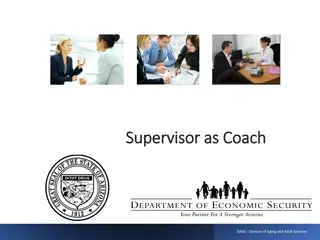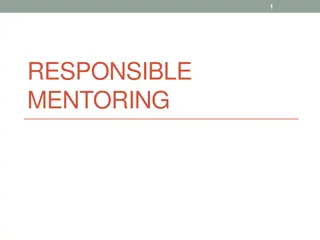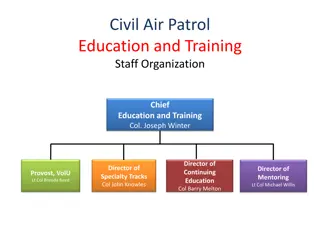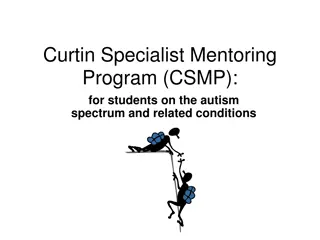
Feedback and Mentoring in Social Work Education
Enhance your knowledge on providing feedback and mentoring in social work education. Learn the importance of mentorship for Community Health Workers (CHWs), effective communication strategies, and the roles of a mentor. Discover five questions to kickstart mentorship and understand the uses of feedback for personal development and performance improvement.
Uploaded on | 0 Views
Download Presentation

Please find below an Image/Link to download the presentation.
The content on the website is provided AS IS for your information and personal use only. It may not be sold, licensed, or shared on other websites without obtaining consent from the author. If you encounter any issues during the download, it is possible that the publisher has removed the file from their server.
You are allowed to download the files provided on this website for personal or commercial use, subject to the condition that they are used lawfully. All files are the property of their respective owners.
The content on the website is provided AS IS for your information and personal use only. It may not be sold, licensed, or shared on other websites without obtaining consent from the author.
E N D
Presentation Transcript
Providing Feedback and Mentoring Boston University School of Social Work Center for Innovation in Social Work & Health
Providing Feedback and Mentoring Learning Objectives Boston University Slideshow Title Goes Here At the end of this unit, you will be able to: Explain the importance of feedback and mentoring for CHWs. Describe activities involved in mentorship of CHWs. Use effective communication to provide constructive feedback. List the 10 strategies for providing corrective feedback.
Providing Feedback and Mentoring Mentoring Mentoring is a process through which an individual offers Boston University Slideshow Title Goes Here professional expertise as well as support to a less experienced team member. A mentor can serve as a teacher, counselor, and advocate to a new team member. Mentoring results in a mutually beneficial professional relationship over time. Mentoring can be included as part of supportive supervision but the mentor does not have to be a manager. Source: http://www.bc.edu/content/dam/files/centers/cwf/individuals/pdf/MentorGuide.pdf
Providing Feedback and Mentoring What Does a Mentor Do? Boston University Slideshow Title Goes Here A mentor may fulfill all or a combination of roles: Advocates creates welcoming environment within the organization. Acquires resources Brings information, opportunities, or experiences to the attention of the CHW. Acts as a role model models positive behaviors. Provides feedback Shares institutional and professional wisdom, critiques performance, makes suggestions. Coaches Helps CHW learn new skills and practice new behaviors. Protects Helps CHW find new and challenging opportunities while protecting her/him from adverse forces Supports Listens with a sympathetic ear, explains unwritten rules, and acknowledges disappointments and triumphs. Source: http://www.bc.edu/content/dam/files/centers/cwf/individuals/pdf/MentorGuide.pdf
Providing Feedback and Mentoring Five Questions to Get Your Mentorship Started Boston University Slideshow Title Goes Here There are five questions to pose to someone you re trying to be a mentor to: 1. What is it that you really want to be and do? 2. What are you doing really well that is helping you get there? 3. What are you not doing well that is preventing you from getting there? 4. What will you do differently tomorrow to meet those challenges? 5. How can I help, and where do you need the most help?
Providing Feedback and Mentoring Uses of Feedback Boston University Slideshow Title Goes Here Personal development: Positive feedback can increase CHW confidence and encourage individuals to continue at or above present level of performance. Improve performance: Addressing performance issues help CHWs determine how to change/improve performance, which can increase feelings of competence.
Providing Feedback and Mentoring Effective Feedback Includes Active Listening Boston University Slideshow Title Goes Here
Providing Feedback and Mentoring Some General Guidelines for GivingFeedback Boston University Slideshow Title Goes Here Make your feedback formative, not summative Be supportive Focus on the issue, not on guilt or blame Be thoughtful Listen to the response of the recipient. Be open to others perception of the situation Encourage dialogue: what are the underlying interests? Help to formulate a plan to deal with the issues raised, and offer help in carrying it out as well
Providing Feedback and Mentoring Some General Guidelines for Accepting Boston University Slideshow Title Goes Here Feedback Listen objectively to what the person is saying Be honest with yourself If you think the person s impression are mistaken, discuss that with them Ask for and use the person s help to formulate and implement a plan to address the issues their feedback raised Thank the person
Providing Feedback and Mentoring Corrective Feedback Boston University Slideshow Title Goes Here Why corrective feedback? Corrective feedback gives supervisors and employees the opportunity for a successful outcome Provides valuable information for both the supervisor and peer Discovers the whys of not meeting work expectations Creates mechanisms for instruction that results in positive outcomes Establishes a way in which the supervisor can address a potential ongoing performance issue in a non-punitive way Creates a culture of open communication which utilizes a variety of feedback mechanisms: coaching model, corrective feedback
Providing Feedback and Mentoring Ten Tips for Providing Corrective Feedback Boston University Slideshow Title Goes Here 1. Correct the behavior, not the team member. 2. Pick correctable behavior to correct. 3. Know the team member s communication style. 4. Be direct. Avoid triangles. 5. Use I instead of you. 6. Label your correction feedback. 7. Make sure your emotions are under control. 8. Align your goals with those of the team member. 9. Give feedback frequently. 10. Remember that people need feedback.
Providing Feedback and Mentoring Managing Your Own Needs Boston University Slideshow Title Goes Here Being a good and effective supervisor is stressful. Supervisors are not perfect at supervising others. Supervisors are human beings and do make mistakes. Find ways to get support in your role as supervisor.






















